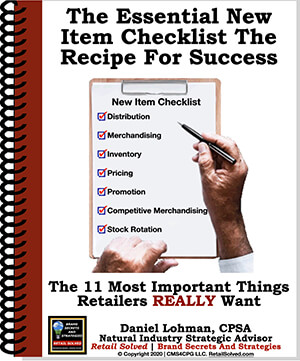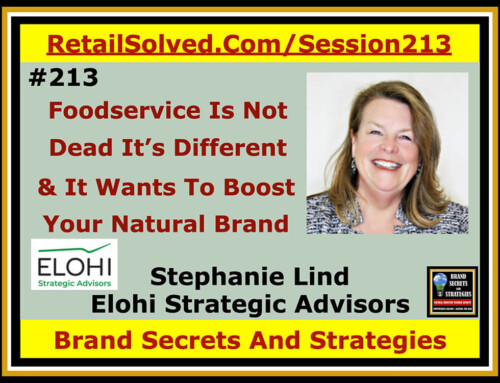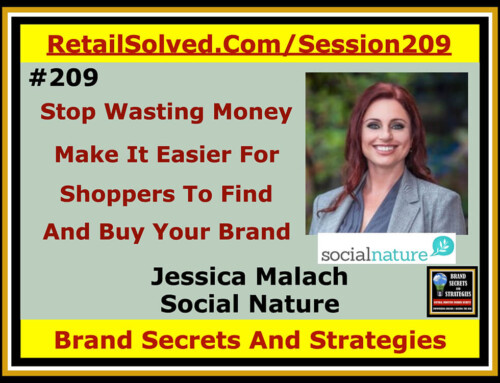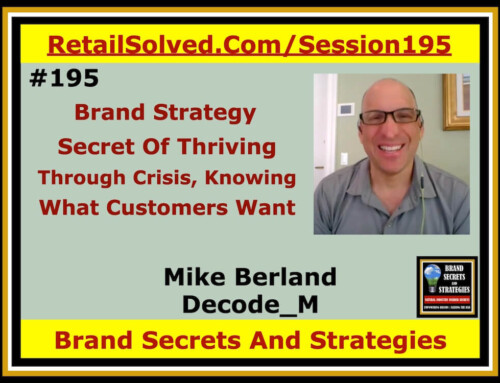What are your goals for 2018? Do they include more shopper foot traffic, full shopping baskets, happy loyal customers, and more sales? Natural products can help you reach those goals and compete more effectively in any economy.
Natural (better for you) products are the fastest growing trend in retail. Some estimates suggest that natural/organic products are growing at well over twice the pace of traditional or conventional items. Everywhere you look you see a trend toward healthier eating. Restaurants now post nutritional information on their menus and food labels are at the grocery store are easier to read than ever before. Food education is front and center in the news and the central theme in many shows especially around this time of year with New Year's resolutions being the focus. Consumers are paying more attention to what they eat.
The more consumers learn about their food, what’s in it, where it comes from, and how it’s produced, the more they want to learn about healthier alternatives. Natural consumers are leading the charge. They know more about the food they eat than any other shopper groups and will pay a premium for products that fully meet their nutritional needs. They are also extremely loyal committed shoppers who see right through gimmicks and false claims. Natural shoppers drive sales through their advocacy and commitment to a healthier way of life. This is why meeting the needs of the natural consumer is the focus for so many retailers.
Natural retailers are setting the standard in the industry and are leading growth in food retail. Their secret is their focus on their shoppers and their commitment to meeting and exceeding their customer’s needs. Conventional retailers could learn a lot from them.
Natural is also a huge trend in conventional. Conventional retailers are working hard to lure the natural consumer into their stores while providing healthier options for their current shoppers. Larger retailers have a competitive advantage when it comes to buying power and the ability to merchandise a wide variety of natural items in their stores. Smaller independents, however, have the unique ability to modify product selection faster and easier than their larger counterparts. Selling natural products effectively requires more than merchandising a few top natural brands in your store. It requires understanding the natural consumer better than your competition. This is where most conventional retailers fall short. They assume they know everything about natural and the natural consumer, their strategies, however, frequently don't align with the values of the natural consumer.
There are several strategies that independent retailers can use to compete effectively against larger chains.
Integrated versus segregated:
There are two merchandising strategies in conventional when it comes to natural products. One strategy segregates natural products with a “store within a store” concept. This is a huge mistake. Shoppers don't want to make “two” shopping trips to fill the items on their list, even if everything is under the same roof. This is especially ineffective considering most consumer’s busy schedules with a limited amount of time to shop.
The better strategy is integrated natural where natural items are merchandised next to their conventional counterparts. This is very effective in helping consumers choose healthier alternatives. A key benefit of this strategy is that it increases category growth and sales by “trading” the shopper up. More importantly, this strategy communicates your commitment to providing shoppers with alternative choices including natural/better-for-you products. This is an excellent way for a retailer to differentiate themselves in the marketplace.
Buy local:
The buy local movement is focused on supporting your local community and keeping dollars local. It includes featuring local brands side-by-side or as an alternative to larger national brands. Buying local is a trend that's good for the local economy. It supports innovation in your neighborhood while reducing the environmental impact of shipping products across the country. Consumers support retailers that support local brands. The National Shop Small movement is a big part of this. It encourages consumers to support the local business in your community. It's simple economics. When you support your community, it becomes stronger and better connected.
Supporting causes (giving back):
Natural consumers like to feel good about the choices they make including where they shop. Giving back is a huge opportunity for the retailer to differentiate themselves from the competition and more importantly connect and align them with their community and their values. It can include high school car washes, meals for the homeless, jobs for veterans and the handicapped, etc.
Giving back should be more than just a marketing slogan or campaign. It needs to be authentic as most consumers can see right through any type of deception. Some of the biggest trends in natural products include products that feed others (buy one and the brand donates one to someone less fortunate). Supporting causes is an excellent way for a retailer to demonstrate their focused and committed to their community and to develop a closely connected relationship with their customers.
Plant-based:
Plant-based products are one of the biggest trends in natural. While vegan is at the heart of the movement, plant-based products provide healthy alternatives that are typically allergen-free and easier for consumers to digest. Plant-based products are a great source of protein and healthy fats that can be found in meat substitutes, dairy substitutes, grain substitutes, etc. With the growing increase of food allergies, plant-based products offer a healthy alternative.
Clean label:
Natural/organic food has been addressing the need for greater transparency in food labeling since its inception. At the core of natural/organic food is a commitment to clean labels that offer a degree of transparency not found in traditional products. Clean labeling products goes well beyond a simple list of ingredients. Clean labeling includes the ability to trace ingredients back to their origin and how they were produced (for example the grass fed hormone free cow that produced the milk). It includes listing easy-to-read ingredients that are found in nature. Clean label products are not modified through aggressive processing and they don't include chemicals that no one can pronounce. Most natural retailers have approved ingredient lists. Products that don't meet their high standards will not be sold in their stores.
The committed natural/organic consumer is more loyal and willing to spend a premium for products they trust and have faith in, products that fully meet the nutritional needs of their family. Natural consumers don't mind spending an additional $1.00 to buy an organic loaf of bread.
Customer service:
This strategy goes well beyond pointing a consumer to an aisle which says, “find it yourself”. Customer service is at the heart of natural retailer’s core competencies. It offers a way to educate and bond with your shoppers. Natural shoppers expect to have their questions answered by well-trained courteous and helpful employees.
This is one of the biggest challenges in conventional, especially when it comes to natural better-for-you products. Independent retailers wanting to differentiate themselves in this area need to understand the trends and product attributes that are driving sales in natural. For example, does your staff really know the difference between organic and Non-GMO? Most consumers believe that Non-GMO is the highest food standard, when in fact, organic is. Whole Foods is committed to Non-GMO labeling every product in their stores by 2018.
Innovative promotional strategies:
Natural retailers are great at developing innovative promotional strategies that are community focused like dog washes, etc. Promotional strategies that focus only on price are ineffective and do little more than dilute the brand (including the retailer brand). Pricing strategies today need to be transparent. Shoppers can check pricing at most every retailer in the market including online while standing in your aisle. For this reason, your pricing needs to be very competitive.
Innovative promotional strategies should include a focus on your core competencies, what makes you stand out in your community and why consumers should trust you. Let them know that you're working harder to earn their business through your actions. This is where all of these recommendations need to be fully integrated.
The retailers who are succeeding today are providing the best product selection, improved quality, transparency, and levels of customer service that differentiate them from their competition. Retailers who want to succeed and grow in this hyper-competitive environment need to focus on what they do best. The days of being a single strategy retailer are gone. Consumers are driving their own unique shopping experience.
Snacking:
Three meals a day is no longer the “rule”. Snacking solutions are a growing trend in all channels. Shoppers are looking for healthy snack alternatives. Retailers who provide a wide selection of healthy natural snacks will differentiate themselves from their competition. Natural products provide excellent better-for-you alternatives.
Innovation:
Innovation for some brands means changing the product label and merchandising it in a different location. This is a missed opportunity. True innovation means offering unique/specialty products not available at every retailer in town. This is where the natural channel excels. Shoppers can now purchase energy bars that are high protein, Gluten Free, Vegan, Non-GMO, Kosher, Macrobiotic, and tasty. These products are leading sales growth in their category as they capitalize on the top trends in natural.
Consumer education:
Eating healthy can be extremely confusing and difficult for most consumers. It seems that most every brand claims that their product is healthier and better for you. Package labeling can also be misleading and confusing. Some brands use the term “natural” as part of their marketing slogan, even though there is nothing natural about the product. As a result, the term natural is somewhat ambiguous to most consumers. This leads frustrated shoppers to shop your competition.
Retailers that are interested in capturing the natural health-conscious consumer need to focus on better-for-you items that provide a greater level of transparency in their ingredients and how they're produced.
Putting the consumer first:
Most retailers talk about the importance of their shoppers but few truly understand and know who their core shopper is, let alone speak their language. Most retailers develop product assortments and merchandising strategies without consulting or paying attention to their core customers. This is a huge mistake for retailers wanting to compete effectively.
Retailers need to develop an intimate one-on-one relationship with their customers. This goes well beyond any loyalty program. Retailers that want to excel in this area need to develop and/or maintain a “conversation” with their shoppers similar to the conversations they have with their trusted friends. Retailers who try to dictate or control shoppers buying habits through poor and limited product selections will ultimately lose out.
Social or digital strategy:
A strong social media/digital strategy is critical in today's hyper-competitive marketplace. Retailers need to engage their shoppers on their level. Most consumers are more tech-savvy than the retailers they shop. More importantly, they are constantly receiving product reviews and testimonials about products, services, and retailers from their social community. Retailers who are not fully engaged will quickly become irrelevant.
Most retailers and brands talk at shoppers and not to them. A strong quality social/digital strategy requires that the retailer develop an intimate one-on-one relationship with their shoppers. This can be the single best strategy for growing and maintaining your customer base. A well-executed digital strategy can be also used to identify product opportunities and assortments that keep customers coming back and engaged.
Bottom line. There’s no one single stand-alone strategy to help a retailer compete effectively in any market. Effective strategies include a healthy balance of the recommendations listed above. The consumer needs to be your primary focus at the heart of every strategy. A distinct competitive advantage is an achievable and attainable goal for any retailer committed to offering their customers natural, organic, better-for-you products.

Want A Competitive Edge? The Recipe For Success
New product innovation is the lifeblood of every brand. New products fuel sustainable growth, attract new shoppers and increase brand awareness. Know the critical steps to get your product on more retailer’s shelves and into the hands of more shoppers.
Empowering Brands | Raising The Bar
Ever wish you just had a roadmap? Well, now you do!
Don’t miss out on all of these FREE RESOURCES (strategic downloadable guides, podcast episodes, list of questions you need to be asking, and know the answers to, the weekly newsletter, articles, and tips of the week. You will also receive access to quick and easy online courses that teach you how to get your brand on the shelf, expand distribution, understand what retailers REALLY want, and address your most pressing challenges and questions.
All tools that you can use, AT NO CHARGE TO YOU, to save you valuable time and money and grow your sales today!
Image is the property of CMS4CPG LLC, distribution or reproduction is expressively prohibited.






